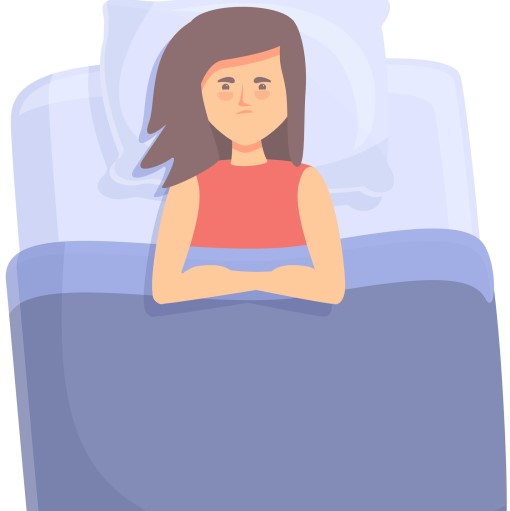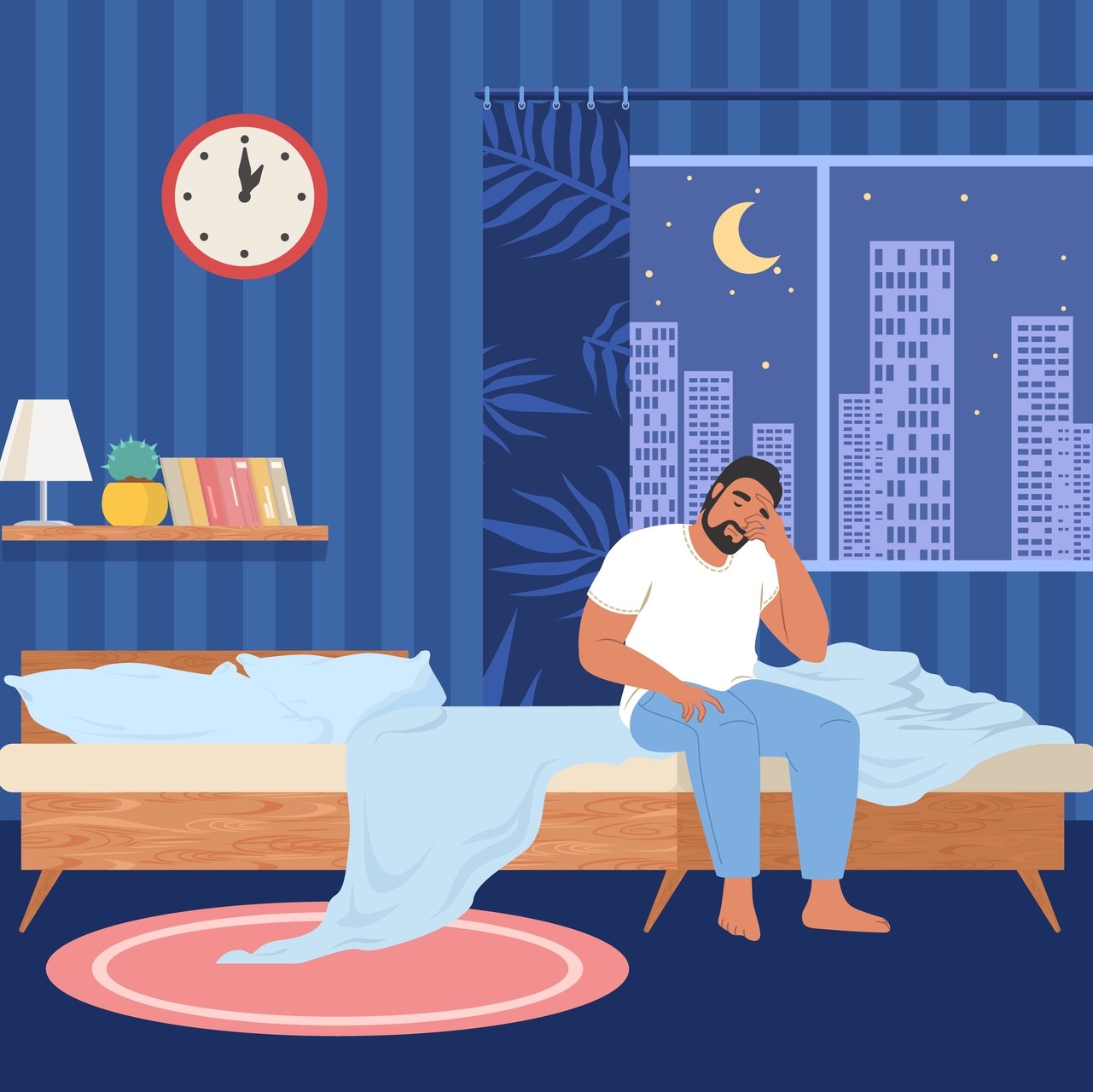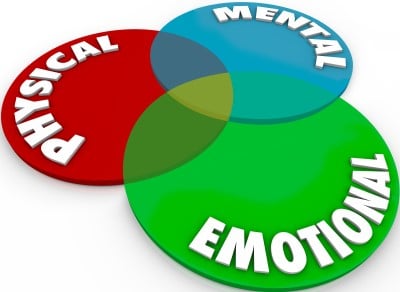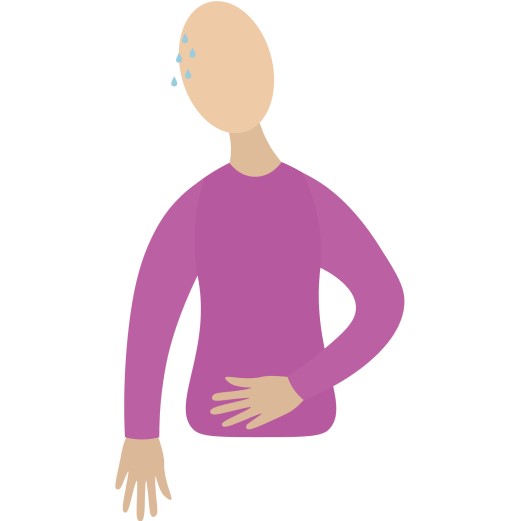
What to try if IBS has got you too depressed to sleep – 13 things to do for better nights
By Jason Wooden, PhD and Kristal McKinney, LICSW, CMHS | October 7, 2022
It’s very common for IBS patients to experience depression and as many as a third also struggle with sleep. Unfortunately, stress, anxiety, and depression from poor sleep can worsen IBS symptoms. Good news – there are plenty of things you can do to avoid a downward spiral of poor sleep, depression, and worsened IBS.
Why it’s so freaking frustrating when you’ve got IBS and feeling too depressed to sleep
Living with IBS can be frustrating enough.
For starters, there’s the unpredictable digestive tract where you’re either constipated from things moving too slow or dealing with diarrhea because things are moving too fast. Then there’s bouts of pain and cramping, embarrassing moments, and the need to stay close to a toilet.
That’s enough to leave anyone feeling down.
However, when you’re struggling with depression AND poor sleep on top of IBS, you’re talking more trouble. That’s because of the toll chronic poor sleep can take on you.
It’s much more than waking up feeling tired.
Sleep deprived people don’t think as clearly, have a harder time coping, don’t perform as well at school or on the job, and struggle with everyday activities.
Relationships and intimacy can suffer even more.
Chronic insomnia can also increase your risk for serious health complications such as high blood pressure, diabetes, and a weakened immune system.
That’s a whole lot at stake.

When IBS has got you feeling too depressed to sleep, it can take things to a whole new level of frustration and add even more unpredictability to your life.
You should know you’re likely not the only IBS sufferer struggling with depression and sleep at night. After all, somewhere around 11% of the world’s population is affected by IBS!
Also, studies have found that as many as 84% of IBS patients suffer from depression.
All the same, it’s understandable if your unpredictable gut has got you feeling down and it’s now wrecking your sleep.
We’re going to take an honest look at what you’re up against and what you can do about it.
You know, it’s not just IBS patients who struggle with depression and poor sleep…
Every night one in three adults struggle with insomnia. Stress, anxiety, and depression are among the most common challenges for sleep.
It’s estimated that 280 million people around the world experience depression. Most individuals with depression experience sleep disturbances.
In fact, would you believe as many as 75% of people suffering from depression have trouble falling and staying asleep?
That’s a whole lot of people in the “too depressed to sleep” club.
And it’s a challenge for people dealing with other medical issues besides IBS. The list includes chronic pain, diabetes, heart attacks, strokes, dementia, and cancer.
So, this depression thing is taking its toll and ruining the sleep of people from all walks of life whether it’s because of IBS or some other reason.
The many links between IBS, depression, and sleep
Studies have found that as many as a third of IBS patients struggle with sleep. There’s also a strong association between IBS, depression, and insomnia.
What they have in common is mind-body connections.

Your mind, brain, behaviors, and body can interact in powerful ways that affect health and wellness. Mind-body connections have been found to play a role in chronic pain, headaches, and many other common conditions whether they are sudden or chronic.
This is especially true for IBS, a condition in which there’s a problem with how the brain and gut work together.
Because of this disconnect, you can get flare ups of abdominal pain and changes in bowel movement leading to diarrhea or constipation.

And there’s a huge link between the gut and mood. So, it’s no surprise that stress, anxiety, and depression can trigger or worsen IBS flareups
There’s a strong mind-body connection for sleep too.
Stress, anxiety, and depression makes it harder to fall asleep and harder to stay asleep.
People who sleep poorly are more at risk for stress, anxiety, and depression. You can get into downward spiral where one cause more of the other.
Stress, anxiety, and depression from poor sleep can also worsen IBS symptoms.
So, you can see there are strong mind-body links between IBS, depression, and poor sleep. If you’re not careful you can get into a vicious cycle where they all cause more of the other.
What to do if IBS has got you feeling too depressed to sleep
Okay, we’ve talked about how things can go wrong. However, it’s NOT all doom and gloom.
There’s plenty you can do to keep from sliding into a cycle of poor sleep, more depression, and more IBS.
Depending on your specific issues and situation, there are plenty of practical remedies worth a try. Some you can do on your own while others may require time and outside support.

It’s important to keep in mind that everybody is different, so figure out what works for you. Our hope is just to make sure you’re aware of all the things you can do.
Depending on your specific issues and situation, your options include:
1) Empowering yourself
Living with IBS can at times feel overwhelming. Recognizing what you can control and doing what you can about them can be empowering and lesson the grip it has on you.
It’s also empowering to engage in and account for your own care, including advocating for other treatments.
2) Improving your sleep hygiene
Given all the connections between IBS, depression, and sleep, it’s important to give yourself a chance for the best possible sleep every night. That means you need to practice good sleep hygiene, the basic rules for healthy sleep.
For better sleep hygiene, you should:
- Wake up and go to bed at the same time every day
- Physical activity
- Avoid naps
- Avoid large meals, alcohol, and stimulants such as caffeine before bedtime
- Maintain a bedtime routine
- Avoid TVs, laptops, and other electronics near bedtime
- Keep your bedroom dark, cool, quiet, & relaxing
3) Stress and anxiety management
Since stress is a factor for both IBS and sleep, it’s important to start doing whatever you can to manage the stress in your life. It could be better self-care, boundary setting, improving your work-life balance, or managing expectations.
It could also be keeping an IBS emergency pack in the car with medicinals, tissues, extra underwear, and clothing.
At night, calming music, aromatherapy, and relaxation exercises before bed can help aid the transition to sleep.
Learn more:
Stress Management (HelpGuide.org)
Six relaxation techniques to reduce stress
4) Knowing your depression triggers
Knowing what they are is half the battle for managing their impact on your sleep, health, and wellness. Whether it’s situations, relationships, or events, you can recognize a trigger promptly and proactively do something.
Some common depression triggers:
- grief and loss
- rejection
- stress
- money problems
- seasonal changes
- life transitions
- lack of sleep
- hormonal changes
- health challenges
- medications
5) Watching what you eat
Start paying more attention to what you eat. This can be helpful for both your sleep and managing your IBS.
It’s a good idea to start to keeping a diary of what foods you eat when you get an IBS flare up. You want avoid eating foods that can worsen your IBS symptoms or upset your stomach before bedtime.
Instead, find foods that you enjoy that are also easy on your gut. Develop a practice around mindful eating.
Your doctor and a nutritionist can help you figure out a diet to support your health and recovery.
6) Physical activity
Some people notice a big difference in their IBS symptoms on the days they do something physical like taking a walk.
Physical activity can be great for insomnia and IBS. It’s a natural mood booster that can relieve stress, fight inflammation, and promote deep sleep.
It can also aid digestion.
So get moving in a way that’s sustainable to you, whether it’s house work, dancing with your favorite tunes, playing with the kids, chair exercises, or just a walk around the neighborhood.
7) Mindfulness Meditation
Mindfulness and meditation are mental practices that teach you to achieve a mental state of calm concentration and awareness of emotions as a means toward being fully present instead of being reactive.
It can be great for calming the mind, gut, and body. In a UCLA study involving 68 IBS patients, an 8-week mindfulness program was found to improve symptoms for 70% of the participants.
Learn more:
Getting Started with Mindfulness
Meditation for IBS (drruscio.com)
8) Breathing exercises
Deep breathing is a great way to calm the mind, relax the body, and reduce stress. Did you know that when you breathe deeply it sends a message to the brain to calm things down?
This can help with managing stress IBS flareups and aid the transition to sleep at bedtime.
Learn more:
4-7-8 breathing
Square breathing (box breathing)
Diaphragmatic Breathing for GI Patients
9) Make sure you’re working with the right doctor
Being heard and feeling that your doctor is seriously considering all of your concerns can make a big difference for your IBS journey. You want a partner that’s going to leave no stone unturned as you collaboratively explore your options.
Your doctor can also proactively check for other underlying health issues linked to poor sleep and digestive disturbances.
10) Support groups (group help)
With so many people struggling with IBS, there’s no need to go it alone. There are plenty of people in your shoes.
An IBS support group can be helpful whether it’s in person or online.
Places for support:
IBS Patient Support Group (ibspatient.org)
IBS Patient Support Group (Facebook)
Smart Patients Irritable Bowel Syndrome Community
IBS Support Groups (UK)
ibs: it’s a pain (Reddit IBS community)
11) Counseling (one-on-one help)
I’ve already mentioned the mind-body connections between IBS, depression, and sleep.
A specialized type of counseling, cognitive behavioral therapy, can help identify and assist with changing thoughts, beliefs, and behaviors. It’s one of the most effective treatments for anxiety, depression, stress, insomnia, and many other challenges.
12) Energy psychology / Integrative therapies
Energy psychology and integrative therapies is a new therapeutic approach that combines eastern practices such as acupuncture with psychology and psychotherapy. It’s currently being used to help with anxiety, depression, trauma, PTSD, and other clinical disorders.
It include practices such as:
- Massage therapy
- Meditation or mindfulness
- Yoga
- Acupuncture or acupressure
- Music or art therapy
- Reiki, healing touch, therapeutic touch
- Tai chi or chi gong
- Nutrition therapy
- Tapping or eye movement therapies
13) Acceptance
Dwelling too much on how you think your body and life should be can actually hinder the healing process. It can intensify negative thoughts and feelings surrounding your situation which can in turn worsen problems with mood and overall health..
Acceptance means acknowledging things as they are and letting go of your negative feelings. This can help break the paralyzing power an illness has over you and empower you to take positive steps to make the best of things.
Natural aids for calming your mind and IBS so you sleep better
There’s a wide variety of natural actives that can help with anxiety, depression, and calming your IBS so that you sleep better at night. Some have been more tested than others and some are beneficial when combined with other ingredients.

Before trying out a natural remedy, it’s recommended that you check with a complementary health specialist about whether it’s right for you, possible side effects, and the best way to use it.
Lavender Essential Oils
Extracts prepared from the flowers of the lavender plant are used to reduce anxiety and promote relaxation.
St. John’s Wort
The plant flowers can help anxiety and promote relaxation. St. John’s wort may also directly stimulate chemicals in the brain that promote sleep.
Ashwagandha
One of the most powerful herbs used in Ayurvedic healing, it’s thought to work as a moderator of the body’s response to stress. The root and berry are used to reduce anxiety and calm the body.
Peppermint oil
Peppermint oil is used topically to help with headaches, muscle aches, joint pain, and itching. It’s also used as an aromatherapy for pain and reducing stress.
A recent study looking at the data from 12 clinical trials concluded that peppermint oil was helpful for managing IBS symptoms.
Learn more:
Peppermint Oil (NCCIH website)
Peppermint Oil for IBS (Healthline)
CBD
CBD (cannabidiol) is derived from the hemp plant which is a cousin of the marijuana plant. Unlike marijuana, it does not contain the psychoactive THC (tetrahydrocannabinol) which causes a “high.”
Studies have shown CBD can help improve sleep quality and help with underlying insomnia causes such as pain and anxiety.
While more research is needed, studies suggest that CBD may be useful for managing IBS symptoms such as pain and inflammation.
Learn more:
CBD For Sleep and Insomnia (American Sleep Association)
CBD for IBS (MedicalNewsToday)
Turmeric
Well known for its use in Indian curries, turmeric is well-known for its powerful anti-inflammatory and anti-oxidant properties. It’s been used to help with ailments ranging from arthritis to heart disease.
Early research suggests it may be beneficial for IBS patients too.
Learn more:
Turmeric (NCCIH website)
Turmeric for IBS (MedicalNewsToday)
You may also be interested in:
IBS:
The POWERFUL Connection Between Mood, Depression, and Sleep
What to try for IBS pain at night
8 reasons your IBS is worse at night and what to try
Can IBS cause you to sleepwalk?
Can CBD worsen IBS and insomnia?
Related:
Can sleep counseling really help?
5 things to know about cognitive behavioral therapy (CBT) counseling
Sleep help and counseling for couples
Natural Sleeping Aids: How they work and how to try them out
Sources:
1. The epidemiology of irritable bowel syndrome. Clin Epidemiol. 2014; 6: 71–80.
2. Anxiety and Depression in Irritable Bowel Syndrome. Indian J Psychol Med. 2017 Nov-Dec; 39(6): 741–745.
3. “Talking Points”, World Sleep Society website
4. Depression, 2021, WHO website
5. Sleep disturbances and depression: risk relationships for subsequent depression and therapeutic implications. Dialogues Clin Neurosci. 2008 Dec; 10(4): 473–481.
6. Depression and Sleep: Understanding the Connection, Johns Hopkins Medicine
7. Prevalence of sleep disorder in irritable bowel syndrome: A systematic review with meta-analysis. Saudi J Gastroenterol. 2018 May-Jun; 24(3): 141–150.
8. The association between irritable bowel syndrome and the coexistence of depression and insomnia. J Psychosom Res. 2017 Feb;93:1-5.
9. 9 Common Depression Triggers, 2022, therecoveryvillage.com
10. Mindfulness meditation: A research-proven way to reduce stress, 2019, American Psychological Association
11. Mindfulness-based stress reduction improves irritable bowel syndrome (IBS) symptoms via specific aspects of mindfulness. Neurogastroenterol Motil. 2020 Sep;32(9):e13828.
12. Stress Management: Breathing Exercises for Relaxation, myhealth.alberta.ca
13. Mindfulness-based stress reduction improves irritable bowel syndrome (IBS) symptoms via specific aspects of mindfulness. Neurogastroenterol Motil. 2020 Sep;32(9):e13828.
Connect with us:
About Us
Better Sleep Simplified® was founded as a place for you to get clear and well-researched information.
Our goal is to make sure you know about your options so that you take action sooner rather than later.
Check us out on YouTube:
Watch and Learn
Helpful sleep tips, interesting sleep facts and statistics you want to know about
Affiliate Disclosure
This site is a participant in the Amazon Services LLC Associates Program and other affiliate advertising programs designed to provide a means for sites to earn advertising fees by advertising and linking to them.
Important: BetterSleepSimplified.com is for informational purposes only and is not intended or implied to be a substitute for professional medical advice, diagnosis, or treatment. Always consult a physician for sleep and health concerns. See additional information.
